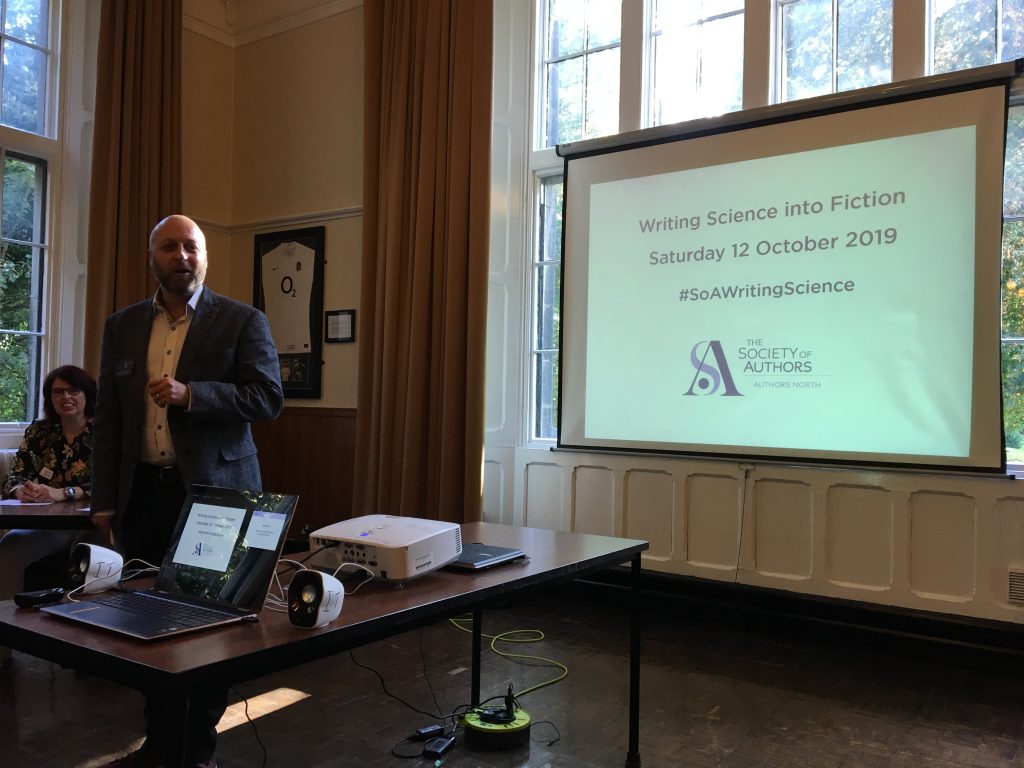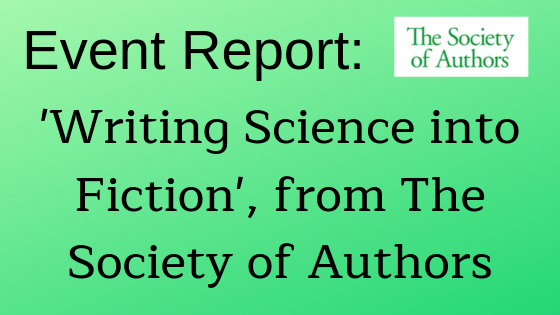
On 12 October I attended a conference in Durham run by The Society of Authors (SoA) called ‘Writing Science into Fiction’. It was an event about how using science in our writing. It was the first event I’ve attended run by the SoA. This particular one was arranged by the northern arm of the Society, called Authors North. I enjoyed the day a lot and found the conference to be well run. And I enjoyed chatting to the other delegates.
There were four sessions:
1. Getting it Right
This was about how to approach science in our writing. The panel consisted of Emma Byrne, a robot scientist; Millie Mockford, a university lecturer on communication; and Rhoda Baxter, author and microbiologist. They talked about how science fiction is good at looking at the consequences of technology, especially the unintended consequences.
A couple of delegates pitched their stories to the panel, which was also interesting and informative.
2. Meet the Publisher
A number of industry insiders talked about what makes a good science fiction submission, and how authors can best work with their publisher. The panel comprised of Francesca T Barbini, owner of Luna Press Publishing; Sam Bradbury, Commissioning Editor at Hodder and Stoughton; and Ra Page, CEO of Comma Press.
This was a really good session and we got a good view of what each of the people do and the differences between their roles and their companies. It was interesting to hear just how many submissions they receive, for example Sam receives 150 submissions per year and she only takes 10 or 11 of them. She only accepts submissions from agents unless Hodder has an open submission window open (the last was three years ago). In contrast, Francesca accepts unagented submissions.
The panel emphasised that authors need to know where their novel fits in terms of the sub-genre and what books it is similar to. It is important to state these when you’re submitting it.
3. Science and the Short Story
This session was Sarah Schofield in conversation with Ra Page of Comma Press. Sarah is a successful short story author and has written stories for Comma Press’s ‘Science into Fiction’ series. This series comprises a number of short story collections on different themes (for example AI and other life, or sleep) where each story is written in consultation with a current scientist. The writer meets the scientist and writes a story based on their area of research. It is a brilliant series and I was extremely interested to hear about it. It has attracted some top writers, for example Justina Robson wrote a story for the first book. Read my interview with her here. My MA tutor, Martyn Bedford also has a story in Beta-Life, the AI and other life volume.
4. Beyond the Book
This session was about how to create stories for video games and comic books. It comprised of Greg Buchanan in conversation with Martin Reed from the Society of Authors. Greg is a novelist but also writes for videogames and comics. He gave a very informative insight into this other side of writing narratives and how a writer could break into this field.
Writing Science into Fiction: Conducting research
Ra Page explained that if writers find they need to ask a scientist questions in order to properly research their stories, then it may be easier than they expect. Most scientists at institutions like universities are part or wholly funded by public money, and a condition of this is that they must explain their work to the public if asked, and engage with informing the public about their research. As such, if a writer emails a scientist with questions about their work, the scientist should respond as long as you make it clear you are sensible and are not going to misrepresent their work.
So that’s all from me on the Writing Science into Fiction event. It was a good day. Let me know your thoughts in the comments below!

